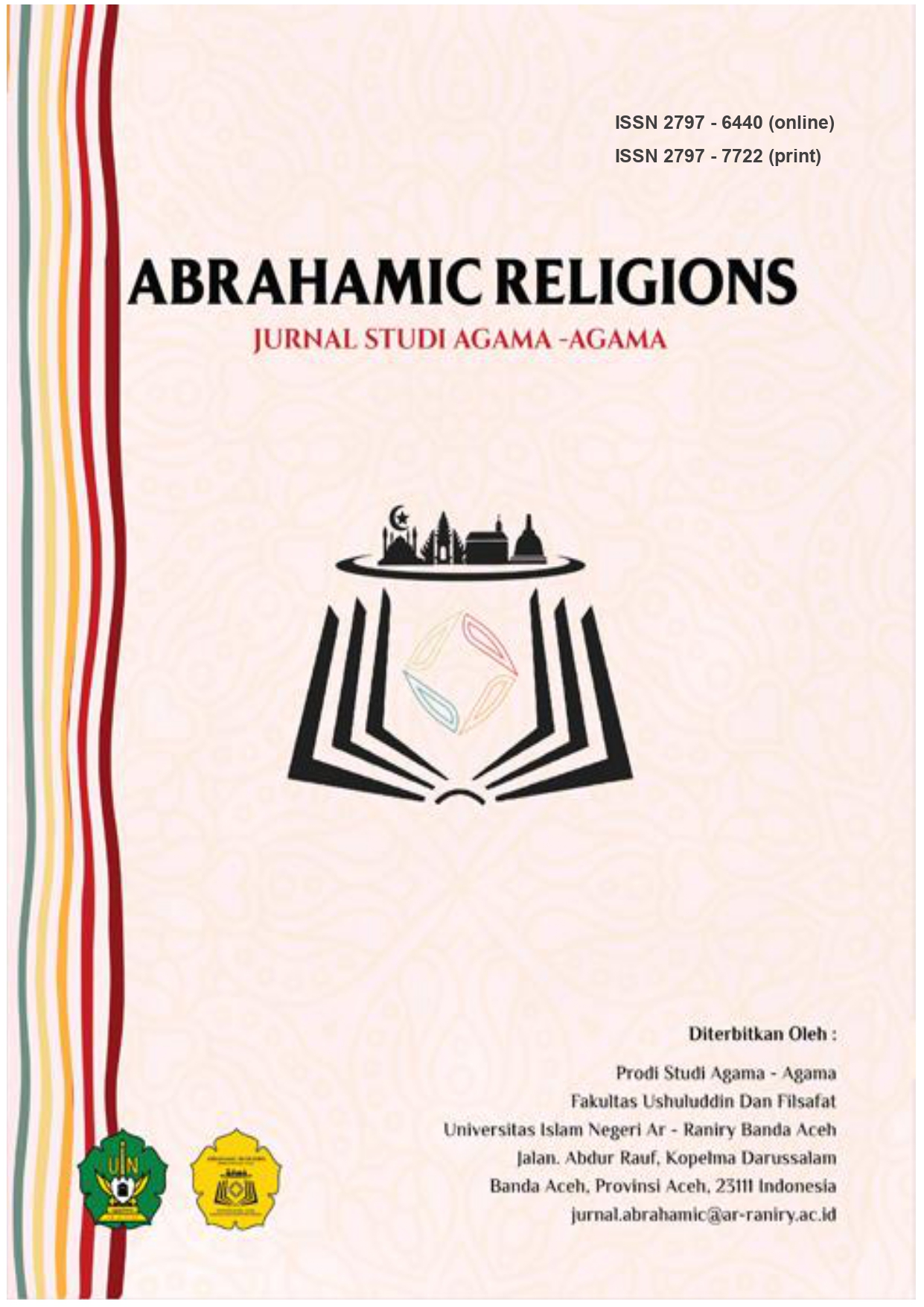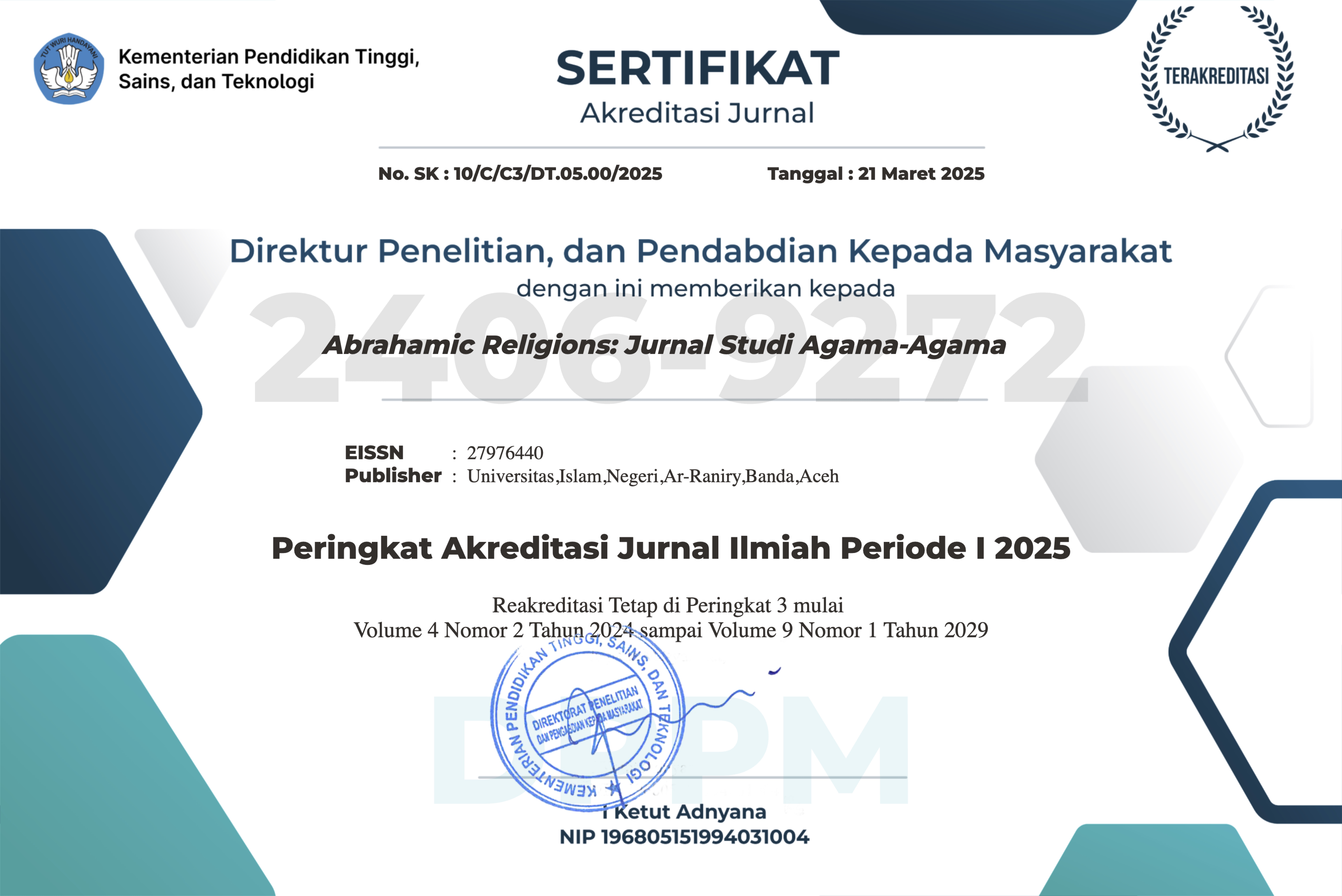ARUS TOP-DOWN DAN BOTTOM-UP PADA GERAKAN DIALOG ANTAR AGAMA DI INDONESIA
DOI:
https://doi.org/10.22373/arj.v1i2.10659Keywords:
Top-Down, Bottom-Up, Interfaith Dialogue, IndonesiaAbstract
The interfaith dialogue movement in the top-down current as described above, namely the movement originating from the state, was welcomed by various communities in Indonesia as a bottom-up current, namely the interfaith dialogue movement originating from the people. At least in this bottom-up flow, there are two communities, namely dialogue developed in academic institutions, and dialogue conducted or facilitated by civil society institutions, such as NGOs (Non-Governmental Organizations), both focusing on dialogue and raising issues. -Other issues related to dialogue. In this research, the researcher focuses only on two groups, namely the state (top-down current) and academic institutions (bottom-up current) trying to examine religious movements in the realm of inter-religious dialogue using social movement theory. There are three key concepts in social movement theory which usually play a very important role in determining the success of collective action. The three concepts include (1) political opportunity structure, (2) mobilizing structures, and (3) framing of action.
References
Ali, A. Mukti. (1970). Dialoog Antar Agama, Jogjakarta: Jajasan Nida.
Ardiansyah (2012). Peran Forum Kerukunan Umat Beragama (FKUB) dalam Menangani Konflik Pendirian Rumah Ibadah, Jurnal Toleransi, Vo. 4, No. 1.
Armstrong, Karen. (2002). Sejarah Tuhan: Kisah Pencarian Tuhan yang Dilakukan oleh Orang- Orang Yahudi, Kristen, dan Islam Selama 4.000 Tahun, terj. Zaimul Am, Bandung: Mizan Media Utama.
Dja’far, Halimah. (2006). Modernisasi Keagamaan Islam Di Indonesia - Tela'ah Pemikiran A. Mukti Ali, Jurnal Kontekstualita, Vol. 21, No. 2.
Djam’annuri. (1993). 70 Tahun H.A. Mukti Ali: Agama dan Masyarakat, Yogyakarta: IAIN Sunan Kalijaga Press.
Fathuddin, Usep. (1998). H. Tarmizi Taher: Globalisasi Kerukunan’ dalam Azyumardi Azra dan Saiful Umam (ed.), Menteri-Menteri Agama RI: Biografi Sosial-Politik, Jakarta: INIS, PPIM, dan Litbang Kemenag.
Harahap, Nursapia. (2014). Penelitian Kepustakaan, Jurnal Iqra’, volume 08 No 01, Mei.
Husin, Khairah. (2014). Peran Mukti Ali Dalam Pengembangan Toleransi Antar Agama Di Indonesia, Jurnal Ushuluddin, Vol. XXI, No. 1.
Inyiak Ridwan Muzir dan M. Syukri (Yogyakarta: Ircisod, 2012).
J.B. Banawiratma (ed.) (2010). Dialog Antarumat Beragama: Gagasan dan Praktik di Indonesia, Bandung: Mizan.
Knitter, Paul F. (1995). One Earth Many Religions – Multifaith Dialogue and Global Responsibility, Maryknoll, New York: Orbis Books.
Maguire, Daniel C. (2004). Energi Suci, Yogyakarta: Pohon Sukma.
Mojzes, Leonard Swidler dan Paul. (2000). The Study of Religion in an Age of Global Dialogue, Philadelphia: Temple University Press.
Mujiburrahan. (2006). Feeling Threated; Muslim-Christian Relations in Indonesia’s New Order, Leiden: Amsterdam University Press.
Mujiburrahman. (2008). State Policies on Religious Diversity in Indonesia, Jurnal Al-Jami’ah, Vol.
Mujiburrahman. (2010). Religion and Dialogue in Indonesia: From The Soeharto Period to The Present, Jurnal Studia Islamika, Vol. 17, No. 3.
Pals, Daniel L. (2012). Seven Theories of Religion - Tujuh Teori Agama Paling Komprehensif, terj.
Rahmadi. (2015). Pemikiran Metodologis A. Mukti Ali Tentang Penelitian Agama, Jurnal Ilmu Ushuluddin, Vol. 14, No. 2.
Ulinnuha, Roma. (2011). Occidentalism In Indonesia; A Study Of Intellectual Ideas Of Mukti Ali And Nurcholis Madjid And Contemporary Legacy, Jurnal Esensia, Vol. XII, No. 1.
Wirawan, I.B. (2013). Teori-Teori Sosial dalam Tiga Paradigma - Fakta Sosial, Definisi Sosial, & Perilaku Sosial, Jakarta: Kencana.
Downloads
Published
Issue
Section
License
Authors who publish in this Journal agree to the following terms:
- Authors retain copyright and grant the journal right of first publication with the work simultaneously licensed under Attribution-ShareAlike 4.0 International (CC BY-SA 4.0) allows others to share the work with an acknowledgment of the work's authorship and initial publication in this journal.
- Authors are able to enter into separate, additional contractual arrangements for the non-exclusive distribution of the journal's published version of the work (e.g., post it to an institutional repository or publish it in a book), with an acknowledgment of its initial publication in this journal.
- Authors are permitted and encouraged to post their work online (e.g., in institutional repositories or on their website) prior to and during the submission process, as it can lead to productive exchanges, as well as earlier and greater citation of published work. (See The Effect of Open Acces)















